Comparison of Psychological Contracts in SMEs: Research Proposal
VerifiedAdded on 2023/04/17
|9
|2034
|123
Report
AI Summary
This research proposal outlines a dissertation study comparing psychological contracts in small to medium-sized enterprises (SMEs) across Western and developing countries. The study aims to understand the concept of psychological contracts, identify key participants, and analyze their impact on employee-employer relationships. The research will explore the theories of exchange and equity, and it will employ a qualitative approach, collecting data through questionnaires administered to HR managers. The proposal details the research objectives, questions, data collection methods, and potential challenges, providing a comprehensive framework for the investigation. The study also considers the future scope of the research, including further literature review and data evaluation. Key authors in this field include McDermott, Zagenczyk, Warner, Dabos, and Rousseau. The research will use both primary and secondary data sources and employ an interpretivism philosophy.
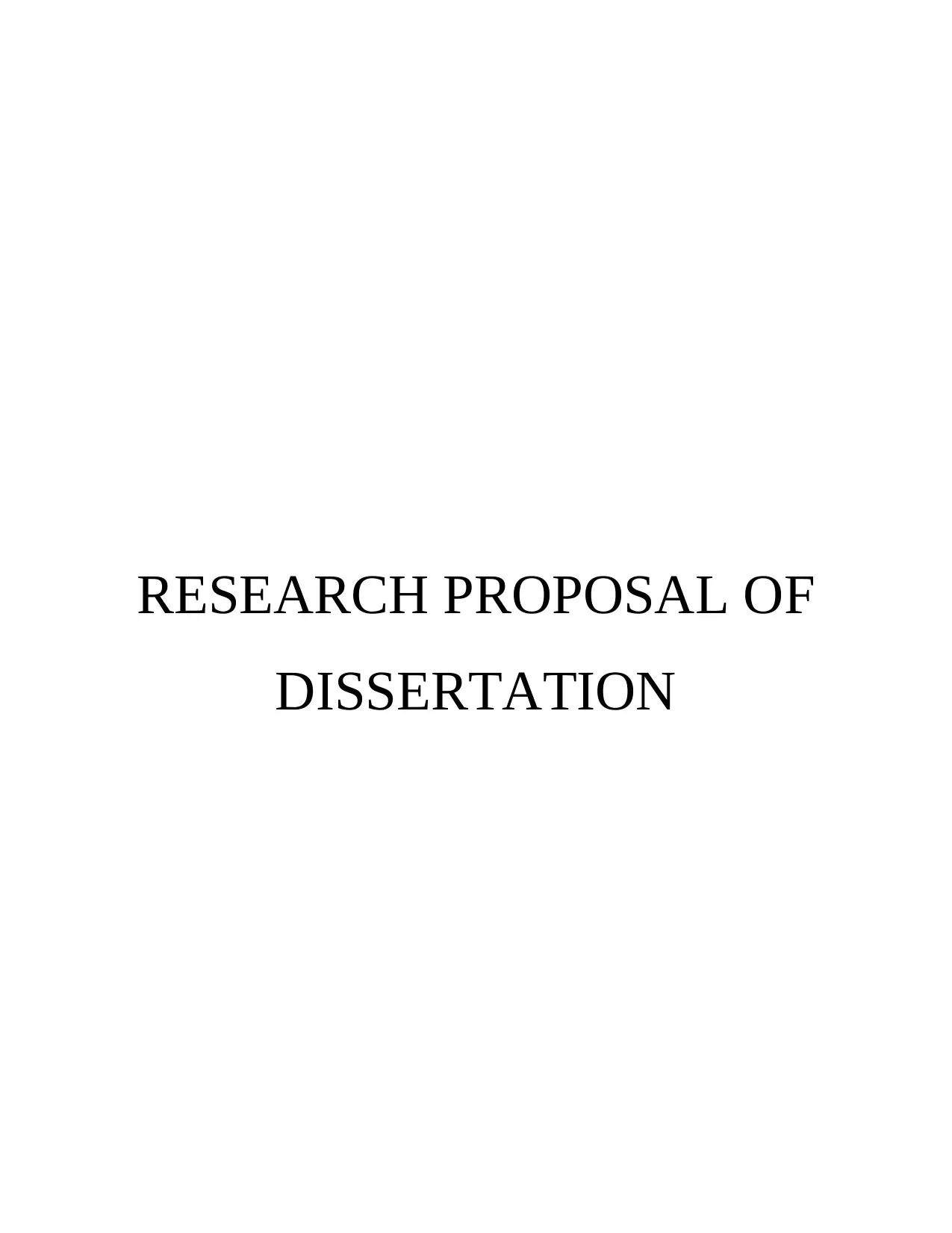
RESEARCH PROPOSAL OF
DISSERTATION
DISSERTATION
Paraphrase This Document
Need a fresh take? Get an instant paraphrase of this document with our AI Paraphraser
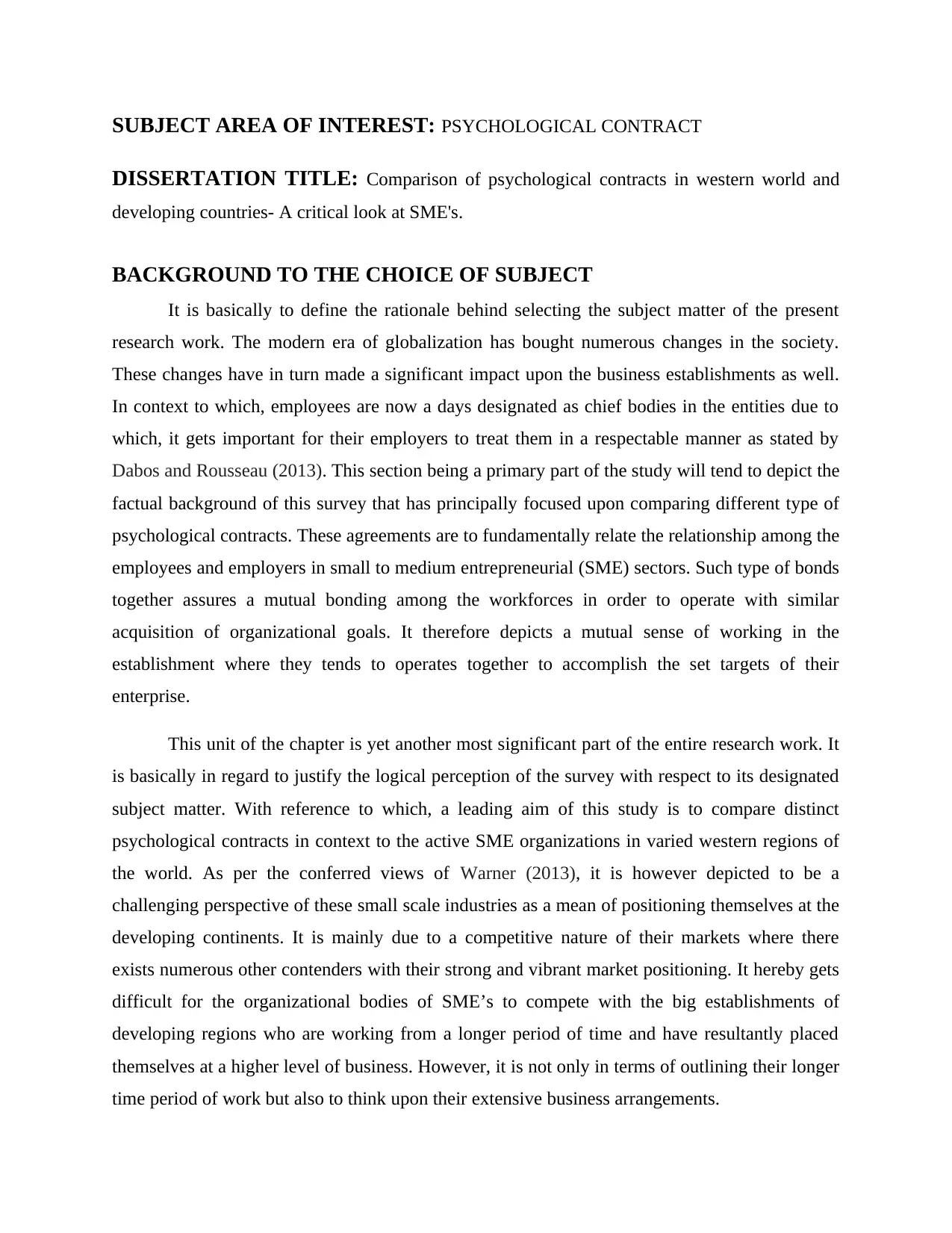
SUBJECT AREA OF INTEREST: PSYCHOLOGICAL CONTRACT
DISSERTATION TITLE: Comparison of psychological contracts in western world and
developing countries- A critical look at SME's.
BACKGROUND TO THE CHOICE OF SUBJECT
It is basically to define the rationale behind selecting the subject matter of the present
research work. The modern era of globalization has bought numerous changes in the society.
These changes have in turn made a significant impact upon the business establishments as well.
In context to which, employees are now a days designated as chief bodies in the entities due to
which, it gets important for their employers to treat them in a respectable manner as stated by
Dabos and Rousseau (2013). This section being a primary part of the study will tend to depict the
factual background of this survey that has principally focused upon comparing different type of
psychological contracts. These agreements are to fundamentally relate the relationship among the
employees and employers in small to medium entrepreneurial (SME) sectors. Such type of bonds
together assures a mutual bonding among the workforces in order to operate with similar
acquisition of organizational goals. It therefore depicts a mutual sense of working in the
establishment where they tends to operates together to accomplish the set targets of their
enterprise.
This unit of the chapter is yet another most significant part of the entire research work. It
is basically in regard to justify the logical perception of the survey with respect to its designated
subject matter. With reference to which, a leading aim of this study is to compare distinct
psychological contracts in context to the active SME organizations in varied western regions of
the world. As per the conferred views of Warner (2013), it is however depicted to be a
challenging perspective of these small scale industries as a mean of positioning themselves at the
developing continents. It is mainly due to a competitive nature of their markets where there
exists numerous other contenders with their strong and vibrant market positioning. It hereby gets
difficult for the organizational bodies of SME’s to compete with the big establishments of
developing regions who are working from a longer period of time and have resultantly placed
themselves at a higher level of business. However, it is not only in terms of outlining their longer
time period of work but also to think upon their extensive business arrangements.
DISSERTATION TITLE: Comparison of psychological contracts in western world and
developing countries- A critical look at SME's.
BACKGROUND TO THE CHOICE OF SUBJECT
It is basically to define the rationale behind selecting the subject matter of the present
research work. The modern era of globalization has bought numerous changes in the society.
These changes have in turn made a significant impact upon the business establishments as well.
In context to which, employees are now a days designated as chief bodies in the entities due to
which, it gets important for their employers to treat them in a respectable manner as stated by
Dabos and Rousseau (2013). This section being a primary part of the study will tend to depict the
factual background of this survey that has principally focused upon comparing different type of
psychological contracts. These agreements are to fundamentally relate the relationship among the
employees and employers in small to medium entrepreneurial (SME) sectors. Such type of bonds
together assures a mutual bonding among the workforces in order to operate with similar
acquisition of organizational goals. It therefore depicts a mutual sense of working in the
establishment where they tends to operates together to accomplish the set targets of their
enterprise.
This unit of the chapter is yet another most significant part of the entire research work. It
is basically in regard to justify the logical perception of the survey with respect to its designated
subject matter. With reference to which, a leading aim of this study is to compare distinct
psychological contracts in context to the active SME organizations in varied western regions of
the world. As per the conferred views of Warner (2013), it is however depicted to be a
challenging perspective of these small scale industries as a mean of positioning themselves at the
developing continents. It is mainly due to a competitive nature of their markets where there
exists numerous other contenders with their strong and vibrant market positioning. It hereby gets
difficult for the organizational bodies of SME’s to compete with the big establishments of
developing regions who are working from a longer period of time and have resultantly placed
themselves at a higher level of business. However, it is not only in terms of outlining their longer
time period of work but also to think upon their extensive business arrangements.
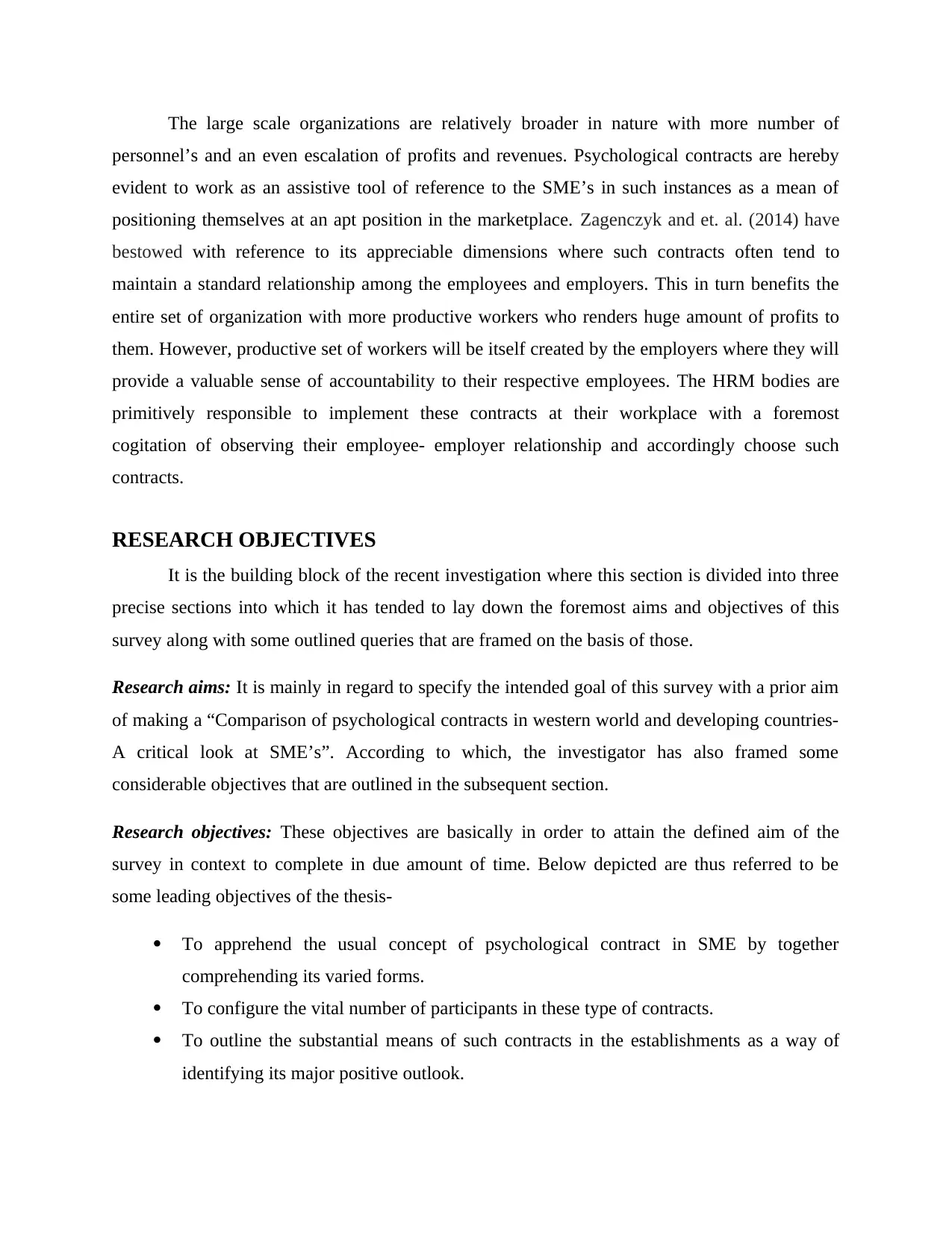
The large scale organizations are relatively broader in nature with more number of
personnel’s and an even escalation of profits and revenues. Psychological contracts are hereby
evident to work as an assistive tool of reference to the SME’s in such instances as a mean of
positioning themselves at an apt position in the marketplace. Zagenczyk and et. al. (2014) have
bestowed with reference to its appreciable dimensions where such contracts often tend to
maintain a standard relationship among the employees and employers. This in turn benefits the
entire set of organization with more productive workers who renders huge amount of profits to
them. However, productive set of workers will be itself created by the employers where they will
provide a valuable sense of accountability to their respective employees. The HRM bodies are
primitively responsible to implement these contracts at their workplace with a foremost
cogitation of observing their employee- employer relationship and accordingly choose such
contracts.
RESEARCH OBJECTIVES
It is the building block of the recent investigation where this section is divided into three
precise sections into which it has tended to lay down the foremost aims and objectives of this
survey along with some outlined queries that are framed on the basis of those.
Research aims: It is mainly in regard to specify the intended goal of this survey with a prior aim
of making a “Comparison of psychological contracts in western world and developing countries-
A critical look at SME’s”. According to which, the investigator has also framed some
considerable objectives that are outlined in the subsequent section.
Research objectives: These objectives are basically in order to attain the defined aim of the
survey in context to complete in due amount of time. Below depicted are thus referred to be
some leading objectives of the thesis-
To apprehend the usual concept of psychological contract in SME by together
comprehending its varied forms.
To configure the vital number of participants in these type of contracts.
To outline the substantial means of such contracts in the establishments as a way of
identifying its major positive outlook.
personnel’s and an even escalation of profits and revenues. Psychological contracts are hereby
evident to work as an assistive tool of reference to the SME’s in such instances as a mean of
positioning themselves at an apt position in the marketplace. Zagenczyk and et. al. (2014) have
bestowed with reference to its appreciable dimensions where such contracts often tend to
maintain a standard relationship among the employees and employers. This in turn benefits the
entire set of organization with more productive workers who renders huge amount of profits to
them. However, productive set of workers will be itself created by the employers where they will
provide a valuable sense of accountability to their respective employees. The HRM bodies are
primitively responsible to implement these contracts at their workplace with a foremost
cogitation of observing their employee- employer relationship and accordingly choose such
contracts.
RESEARCH OBJECTIVES
It is the building block of the recent investigation where this section is divided into three
precise sections into which it has tended to lay down the foremost aims and objectives of this
survey along with some outlined queries that are framed on the basis of those.
Research aims: It is mainly in regard to specify the intended goal of this survey with a prior aim
of making a “Comparison of psychological contracts in western world and developing countries-
A critical look at SME’s”. According to which, the investigator has also framed some
considerable objectives that are outlined in the subsequent section.
Research objectives: These objectives are basically in order to attain the defined aim of the
survey in context to complete in due amount of time. Below depicted are thus referred to be
some leading objectives of the thesis-
To apprehend the usual concept of psychological contract in SME by together
comprehending its varied forms.
To configure the vital number of participants in these type of contracts.
To outline the substantial means of such contracts in the establishments as a way of
identifying its major positive outlook.
⊘ This is a preview!⊘
Do you want full access?
Subscribe today to unlock all pages.

Trusted by 1+ million students worldwide
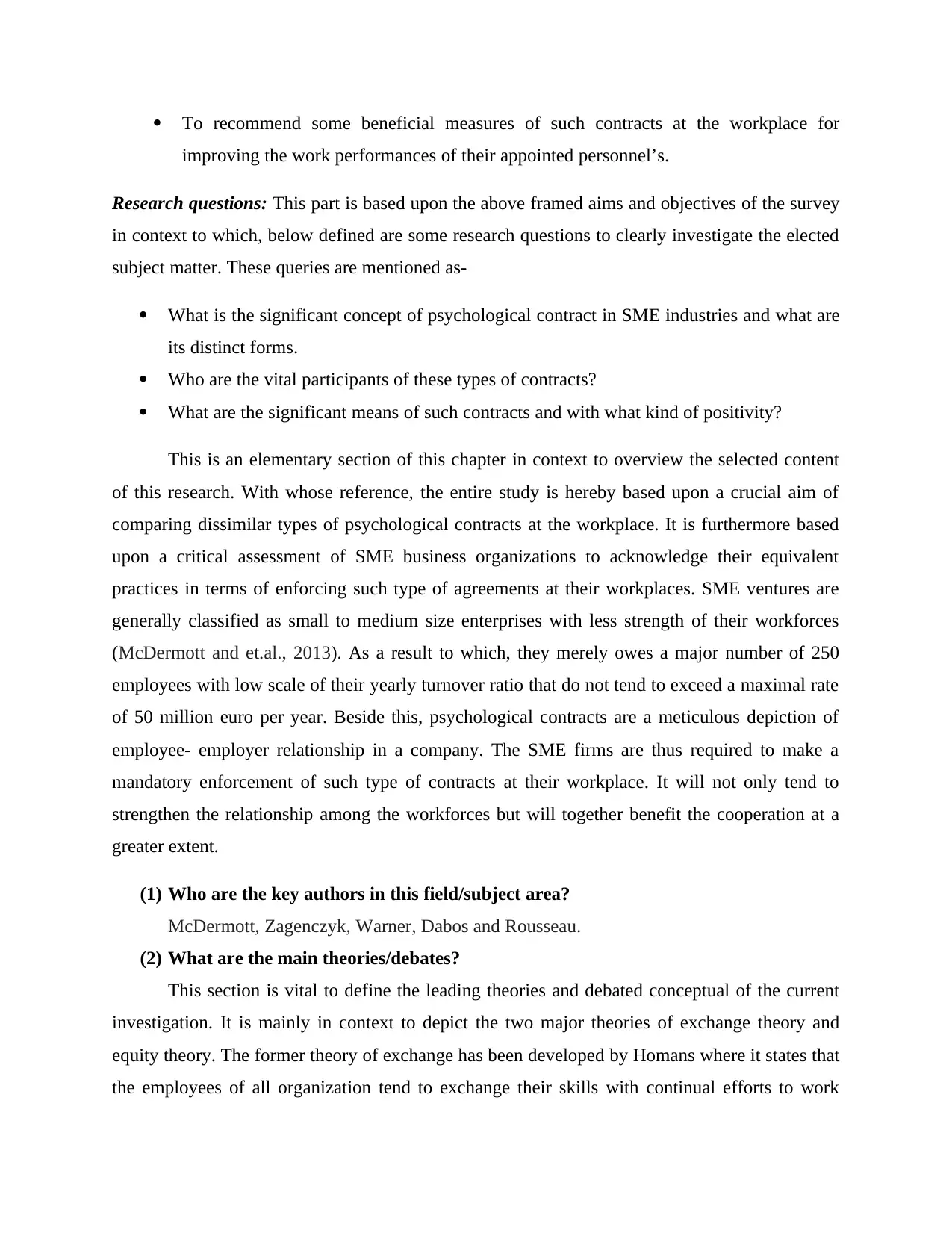
To recommend some beneficial measures of such contracts at the workplace for
improving the work performances of their appointed personnel’s.
Research questions: This part is based upon the above framed aims and objectives of the survey
in context to which, below defined are some research questions to clearly investigate the elected
subject matter. These queries are mentioned as-
What is the significant concept of psychological contract in SME industries and what are
its distinct forms.
Who are the vital participants of these types of contracts?
What are the significant means of such contracts and with what kind of positivity?
This is an elementary section of this chapter in context to overview the selected content
of this research. With whose reference, the entire study is hereby based upon a crucial aim of
comparing dissimilar types of psychological contracts at the workplace. It is furthermore based
upon a critical assessment of SME business organizations to acknowledge their equivalent
practices in terms of enforcing such type of agreements at their workplaces. SME ventures are
generally classified as small to medium size enterprises with less strength of their workforces
(McDermott and et.al., 2013). As a result to which, they merely owes a major number of 250
employees with low scale of their yearly turnover ratio that do not tend to exceed a maximal rate
of 50 million euro per year. Beside this, psychological contracts are a meticulous depiction of
employee- employer relationship in a company. The SME firms are thus required to make a
mandatory enforcement of such type of contracts at their workplace. It will not only tend to
strengthen the relationship among the workforces but will together benefit the cooperation at a
greater extent.
(1) Who are the key authors in this field/subject area?
McDermott, Zagenczyk, Warner, Dabos and Rousseau.
(2) What are the main theories/debates?
This section is vital to define the leading theories and debated conceptual of the current
investigation. It is mainly in context to depict the two major theories of exchange theory and
equity theory. The former theory of exchange has been developed by Homans where it states that
the employees of all organization tend to exchange their skills with continual efforts to work
improving the work performances of their appointed personnel’s.
Research questions: This part is based upon the above framed aims and objectives of the survey
in context to which, below defined are some research questions to clearly investigate the elected
subject matter. These queries are mentioned as-
What is the significant concept of psychological contract in SME industries and what are
its distinct forms.
Who are the vital participants of these types of contracts?
What are the significant means of such contracts and with what kind of positivity?
This is an elementary section of this chapter in context to overview the selected content
of this research. With whose reference, the entire study is hereby based upon a crucial aim of
comparing dissimilar types of psychological contracts at the workplace. It is furthermore based
upon a critical assessment of SME business organizations to acknowledge their equivalent
practices in terms of enforcing such type of agreements at their workplaces. SME ventures are
generally classified as small to medium size enterprises with less strength of their workforces
(McDermott and et.al., 2013). As a result to which, they merely owes a major number of 250
employees with low scale of their yearly turnover ratio that do not tend to exceed a maximal rate
of 50 million euro per year. Beside this, psychological contracts are a meticulous depiction of
employee- employer relationship in a company. The SME firms are thus required to make a
mandatory enforcement of such type of contracts at their workplace. It will not only tend to
strengthen the relationship among the workforces but will together benefit the cooperation at a
greater extent.
(1) Who are the key authors in this field/subject area?
McDermott, Zagenczyk, Warner, Dabos and Rousseau.
(2) What are the main theories/debates?
This section is vital to define the leading theories and debated conceptual of the current
investigation. It is mainly in context to depict the two major theories of exchange theory and
equity theory. The former theory of exchange has been developed by Homans where it states that
the employees of all organization tend to exchange their skills with continual efforts to work
Paraphrase This Document
Need a fresh take? Get an instant paraphrase of this document with our AI Paraphraser
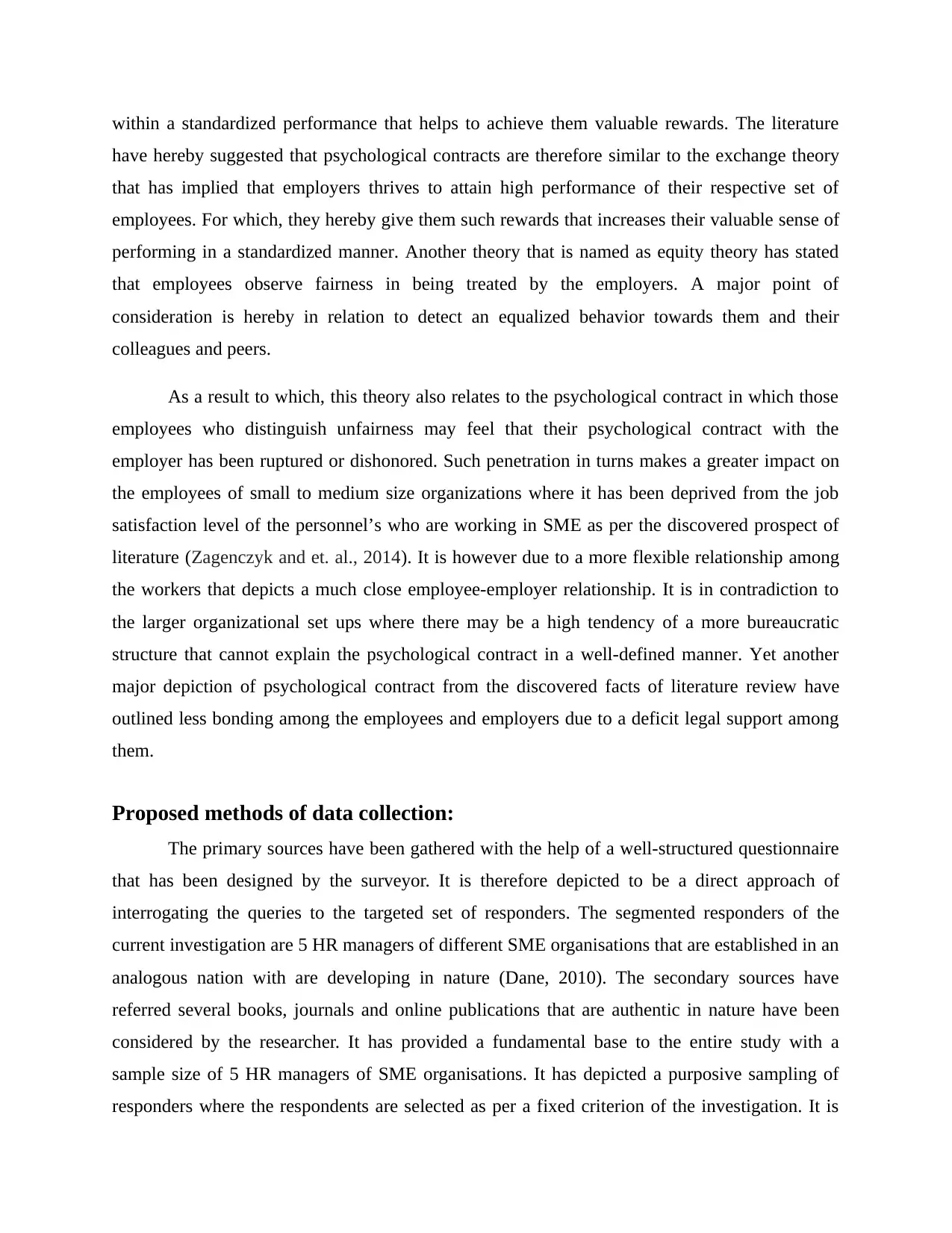
within a standardized performance that helps to achieve them valuable rewards. The literature
have hereby suggested that psychological contracts are therefore similar to the exchange theory
that has implied that employers thrives to attain high performance of their respective set of
employees. For which, they hereby give them such rewards that increases their valuable sense of
performing in a standardized manner. Another theory that is named as equity theory has stated
that employees observe fairness in being treated by the employers. A major point of
consideration is hereby in relation to detect an equalized behavior towards them and their
colleagues and peers.
As a result to which, this theory also relates to the psychological contract in which those
employees who distinguish unfairness may feel that their psychological contract with the
employer has been ruptured or dishonored. Such penetration in turns makes a greater impact on
the employees of small to medium size organizations where it has been deprived from the job
satisfaction level of the personnel’s who are working in SME as per the discovered prospect of
literature (Zagenczyk and et. al., 2014). It is however due to a more flexible relationship among
the workers that depicts a much close employee-employer relationship. It is in contradiction to
the larger organizational set ups where there may be a high tendency of a more bureaucratic
structure that cannot explain the psychological contract in a well-defined manner. Yet another
major depiction of psychological contract from the discovered facts of literature review have
outlined less bonding among the employees and employers due to a deficit legal support among
them.
Proposed methods of data collection:
The primary sources have been gathered with the help of a well-structured questionnaire
that has been designed by the surveyor. It is therefore depicted to be a direct approach of
interrogating the queries to the targeted set of responders. The segmented responders of the
current investigation are 5 HR managers of different SME organisations that are established in an
analogous nation with are developing in nature (Dane, 2010). The secondary sources have
referred several books, journals and online publications that are authentic in nature have been
considered by the researcher. It has provided a fundamental base to the entire study with a
sample size of 5 HR managers of SME organisations. It has depicted a purposive sampling of
responders where the respondents are selected as per a fixed criterion of the investigation. It is
have hereby suggested that psychological contracts are therefore similar to the exchange theory
that has implied that employers thrives to attain high performance of their respective set of
employees. For which, they hereby give them such rewards that increases their valuable sense of
performing in a standardized manner. Another theory that is named as equity theory has stated
that employees observe fairness in being treated by the employers. A major point of
consideration is hereby in relation to detect an equalized behavior towards them and their
colleagues and peers.
As a result to which, this theory also relates to the psychological contract in which those
employees who distinguish unfairness may feel that their psychological contract with the
employer has been ruptured or dishonored. Such penetration in turns makes a greater impact on
the employees of small to medium size organizations where it has been deprived from the job
satisfaction level of the personnel’s who are working in SME as per the discovered prospect of
literature (Zagenczyk and et. al., 2014). It is however due to a more flexible relationship among
the workers that depicts a much close employee-employer relationship. It is in contradiction to
the larger organizational set ups where there may be a high tendency of a more bureaucratic
structure that cannot explain the psychological contract in a well-defined manner. Yet another
major depiction of psychological contract from the discovered facts of literature review have
outlined less bonding among the employees and employers due to a deficit legal support among
them.
Proposed methods of data collection:
The primary sources have been gathered with the help of a well-structured questionnaire
that has been designed by the surveyor. It is therefore depicted to be a direct approach of
interrogating the queries to the targeted set of responders. The segmented responders of the
current investigation are 5 HR managers of different SME organisations that are established in an
analogous nation with are developing in nature (Dane, 2010). The secondary sources have
referred several books, journals and online publications that are authentic in nature have been
considered by the researcher. It has provided a fundamental base to the entire study with a
sample size of 5 HR managers of SME organisations. It has depicted a purposive sampling of
responders where the respondents are selected as per a fixed criterion of the investigation. It is
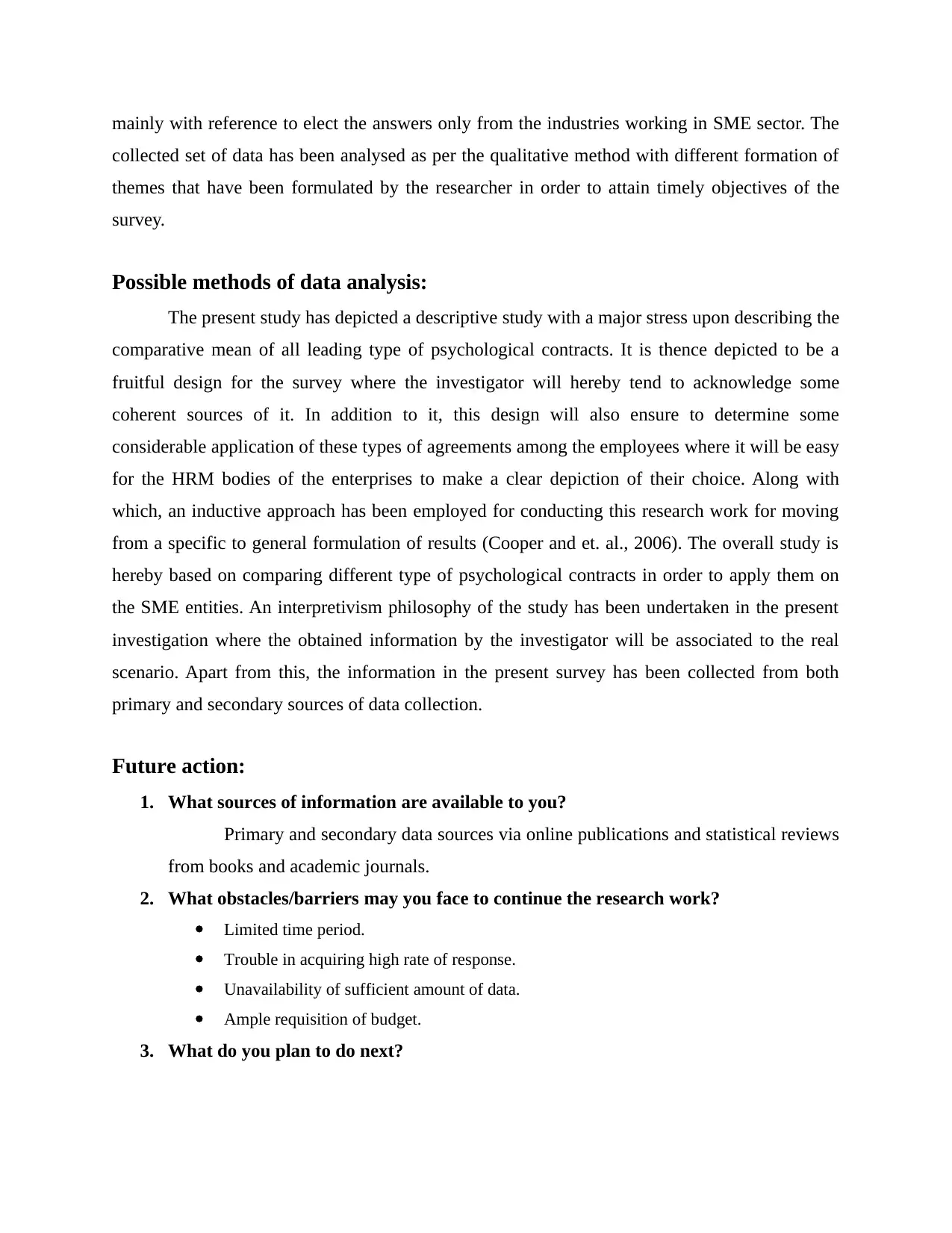
mainly with reference to elect the answers only from the industries working in SME sector. The
collected set of data has been analysed as per the qualitative method with different formation of
themes that have been formulated by the researcher in order to attain timely objectives of the
survey.
Possible methods of data analysis:
The present study has depicted a descriptive study with a major stress upon describing the
comparative mean of all leading type of psychological contracts. It is thence depicted to be a
fruitful design for the survey where the investigator will hereby tend to acknowledge some
coherent sources of it. In addition to it, this design will also ensure to determine some
considerable application of these types of agreements among the employees where it will be easy
for the HRM bodies of the enterprises to make a clear depiction of their choice. Along with
which, an inductive approach has been employed for conducting this research work for moving
from a specific to general formulation of results (Cooper and et. al., 2006). The overall study is
hereby based on comparing different type of psychological contracts in order to apply them on
the SME entities. An interpretivism philosophy of the study has been undertaken in the present
investigation where the obtained information by the investigator will be associated to the real
scenario. Apart from this, the information in the present survey has been collected from both
primary and secondary sources of data collection.
Future action:
1. What sources of information are available to you?
Primary and secondary data sources via online publications and statistical reviews
from books and academic journals.
2. What obstacles/barriers may you face to continue the research work?
Limited time period.
Trouble in acquiring high rate of response.
Unavailability of sufficient amount of data.
Ample requisition of budget.
3. What do you plan to do next?
collected set of data has been analysed as per the qualitative method with different formation of
themes that have been formulated by the researcher in order to attain timely objectives of the
survey.
Possible methods of data analysis:
The present study has depicted a descriptive study with a major stress upon describing the
comparative mean of all leading type of psychological contracts. It is thence depicted to be a
fruitful design for the survey where the investigator will hereby tend to acknowledge some
coherent sources of it. In addition to it, this design will also ensure to determine some
considerable application of these types of agreements among the employees where it will be easy
for the HRM bodies of the enterprises to make a clear depiction of their choice. Along with
which, an inductive approach has been employed for conducting this research work for moving
from a specific to general formulation of results (Cooper and et. al., 2006). The overall study is
hereby based on comparing different type of psychological contracts in order to apply them on
the SME entities. An interpretivism philosophy of the study has been undertaken in the present
investigation where the obtained information by the investigator will be associated to the real
scenario. Apart from this, the information in the present survey has been collected from both
primary and secondary sources of data collection.
Future action:
1. What sources of information are available to you?
Primary and secondary data sources via online publications and statistical reviews
from books and academic journals.
2. What obstacles/barriers may you face to continue the research work?
Limited time period.
Trouble in acquiring high rate of response.
Unavailability of sufficient amount of data.
Ample requisition of budget.
3. What do you plan to do next?
⊘ This is a preview!⊘
Do you want full access?
Subscribe today to unlock all pages.

Trusted by 1+ million students worldwide

It is to fundamentally predict the future scope of research where the first few weeks
of the survey will require more focus upon a proper development of the literature review in order
to critique different views of the authors. In addition to which, the investigator is also required
referring to a significant measure secondary data in order to support the discovered arguments in
the literature review. It is essentially with reference to accomplish the framed objectives of the
research by lastly evaluating the secondary data.
of the survey will require more focus upon a proper development of the literature review in order
to critique different views of the authors. In addition to which, the investigator is also required
referring to a significant measure secondary data in order to support the discovered arguments in
the literature review. It is essentially with reference to accomplish the framed objectives of the
research by lastly evaluating the secondary data.
Paraphrase This Document
Need a fresh take? Get an instant paraphrase of this document with our AI Paraphraser

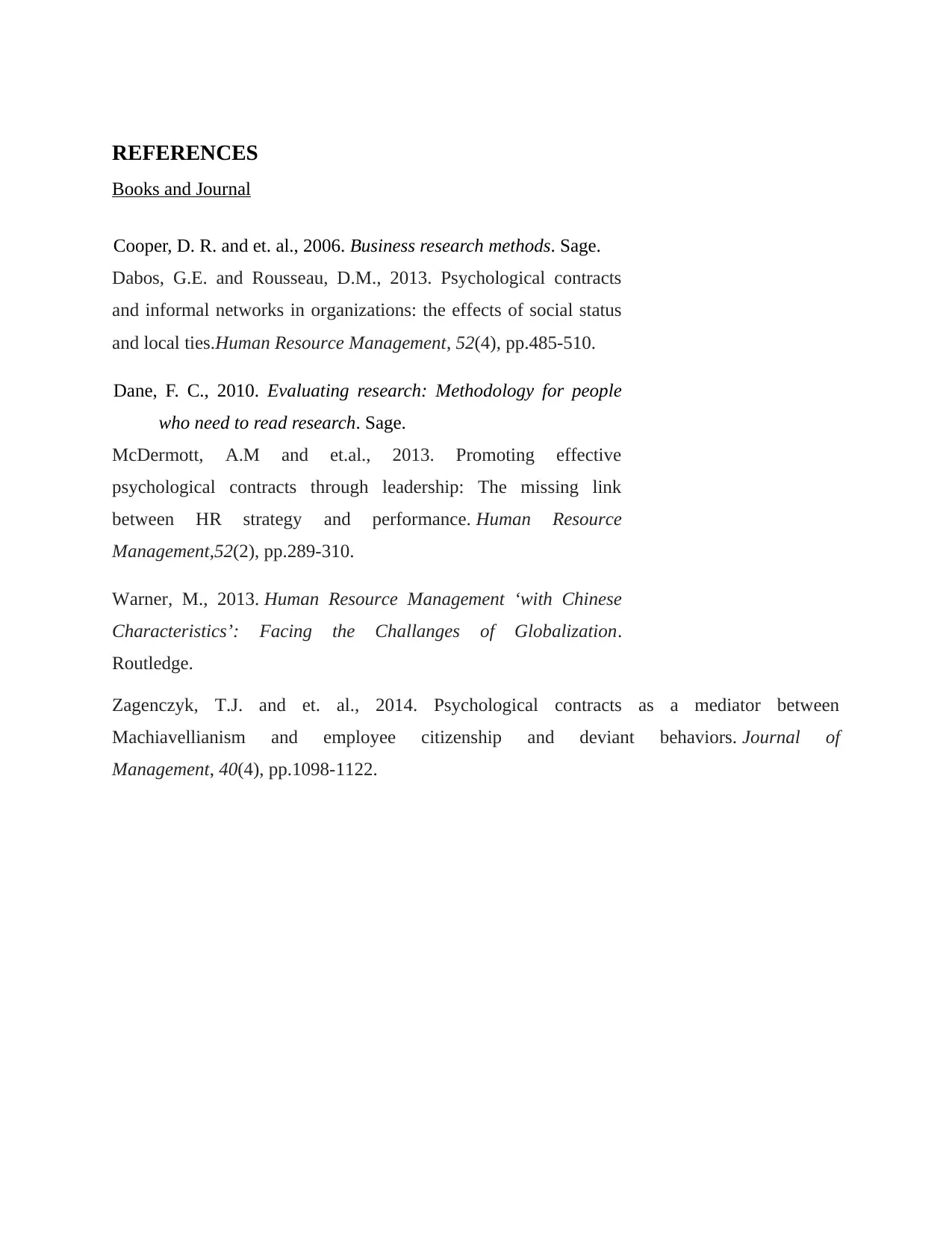
REFERENCES
Books and Journal
Cooper, D. R. and et. al., 2006. Business research methods. Sage.
Dabos, G.E. and Rousseau, D.M., 2013. Psychological contracts
and informal networks in organizations: the effects of social status
and local ties.Human Resource Management, 52(4), pp.485-510.
Dane, F. C., 2010. Evaluating research: Methodology for people
who need to read research. Sage.
McDermott, A.M and et.al., 2013. Promoting effective
psychological contracts through leadership: The missing link
between HR strategy and performance. Human Resource
Management,52(2), pp.289-310.
Warner, M., 2013. Human Resource Management ‘with Chinese
Characteristics’: Facing the Challanges of Globalization.
Routledge.
Zagenczyk, T.J. and et. al., 2014. Psychological contracts as a mediator between
Machiavellianism and employee citizenship and deviant behaviors. Journal of
Management, 40(4), pp.1098-1122.
Books and Journal
Cooper, D. R. and et. al., 2006. Business research methods. Sage.
Dabos, G.E. and Rousseau, D.M., 2013. Psychological contracts
and informal networks in organizations: the effects of social status
and local ties.Human Resource Management, 52(4), pp.485-510.
Dane, F. C., 2010. Evaluating research: Methodology for people
who need to read research. Sage.
McDermott, A.M and et.al., 2013. Promoting effective
psychological contracts through leadership: The missing link
between HR strategy and performance. Human Resource
Management,52(2), pp.289-310.
Warner, M., 2013. Human Resource Management ‘with Chinese
Characteristics’: Facing the Challanges of Globalization.
Routledge.
Zagenczyk, T.J. and et. al., 2014. Psychological contracts as a mediator between
Machiavellianism and employee citizenship and deviant behaviors. Journal of
Management, 40(4), pp.1098-1122.
⊘ This is a preview!⊘
Do you want full access?
Subscribe today to unlock all pages.

Trusted by 1+ million students worldwide
1 out of 9
Your All-in-One AI-Powered Toolkit for Academic Success.
+13062052269
info@desklib.com
Available 24*7 on WhatsApp / Email
![[object Object]](/_next/static/media/star-bottom.7253800d.svg)
Unlock your academic potential
Copyright © 2020–2026 A2Z Services. All Rights Reserved. Developed and managed by ZUCOL.

